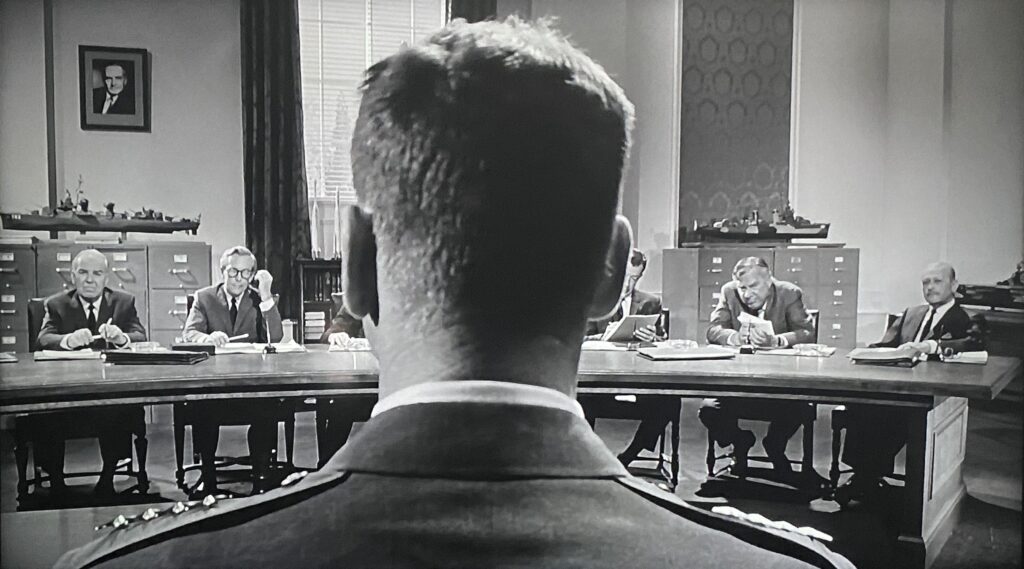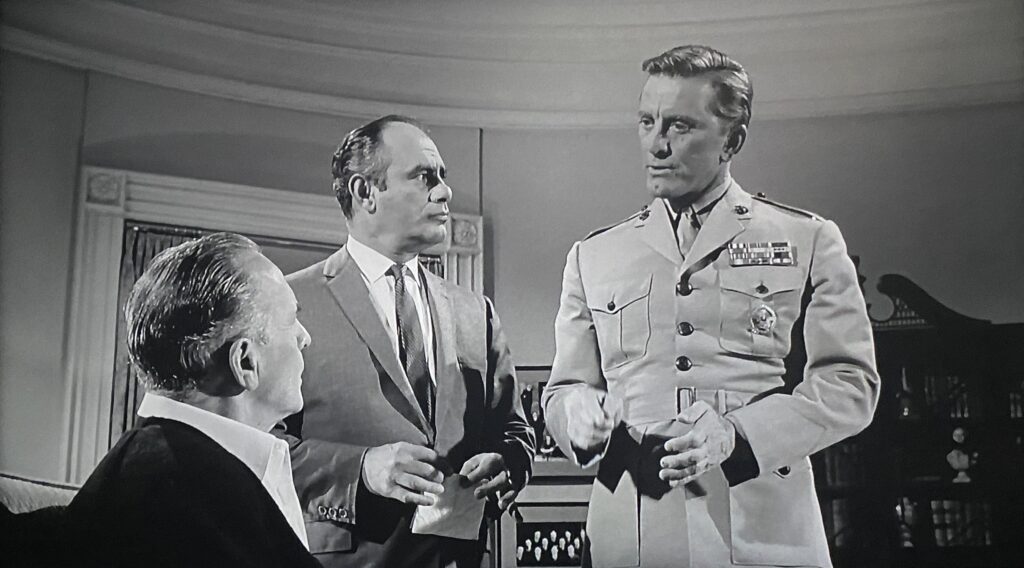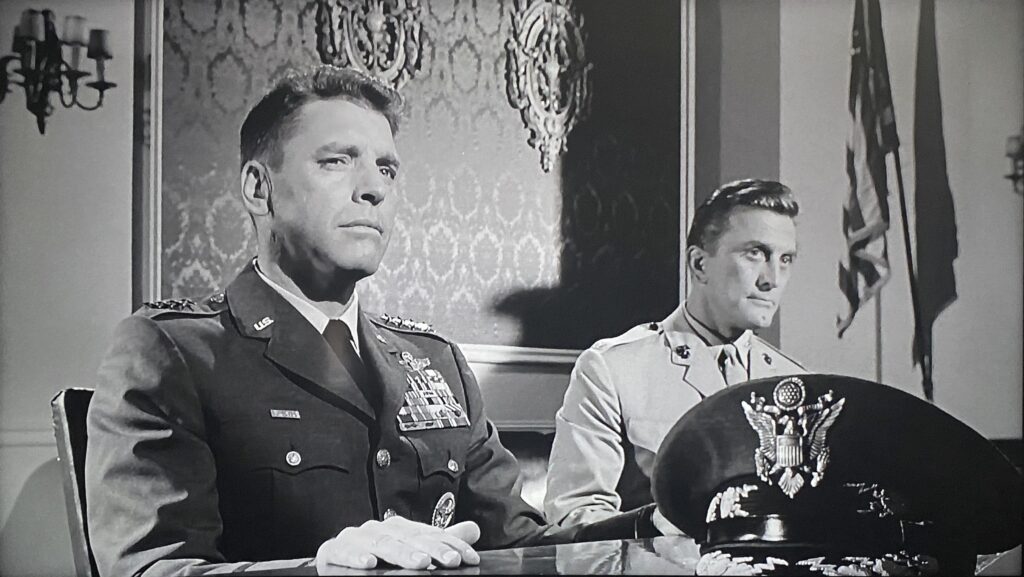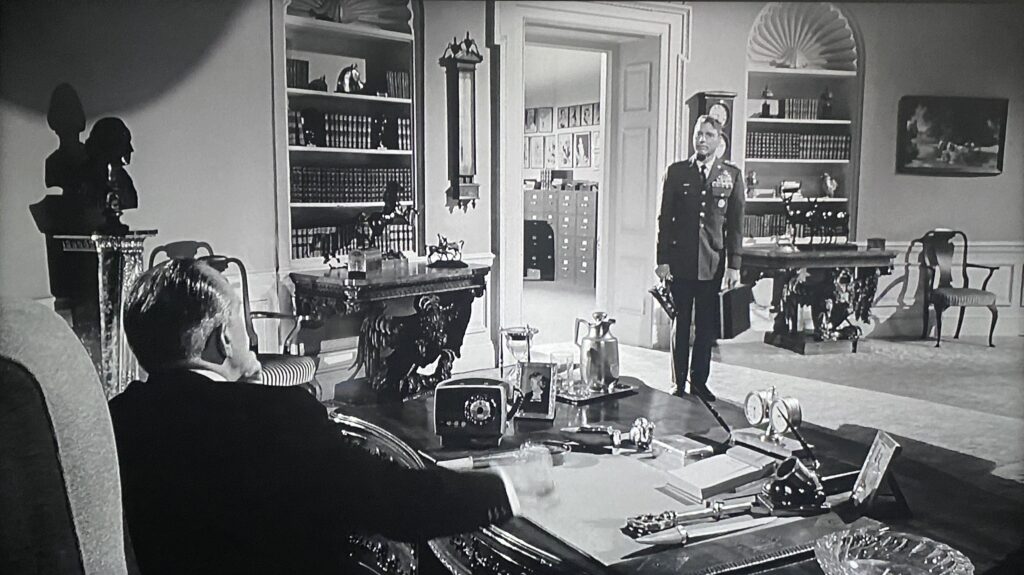| J.R. Jones |

Seven Days in May plays at the Trylon Cinema from Friday, September 20th, through Sunday, September 22nd. Visit trylon.org for tickets and more information.
Last spring the New Republic published a theme issue titled “American Fascism: What It Would Look Like,” with a cover image of Der Donald staring bullets at the reader in closely-cropped hair and a Fuhrer mustache. Eight different stories examine how a second Trump presidency would impact the law, education, media, and other aspects of U.S. society. In one piece, Rosa Brooks, a law professor at Georgetown University, explodes the “liberal fantasy” that the U.S. armed forces would step in to save democracy if a re-elected President Trump refused to leave office. “It’s a wildly unlikely prospect, given deeply internalized norms of civilian control,” Brooks writes, “and it’s also organizationally unimaginable, given the dispersed nature of U.S. military power and the military’s complex command structure.”1
John Frankenheimer’s political thriller Seven Days in May (1964) imagines a similar scenario, though instead of the generals protecting the Constitution from the president, the president must protect the Constitution from the generals. Adapted from a best-selling novel by Fletcher Knebel and Charles Bailey II, the film centers on an Air Force general (Kirk Douglas) who discovers that his boss (Burt Lancaster), Chairman of the Joint Chiefs of Staff, is conspiring with the other chiefs of staff to remove the liberal commander-in-chief (Fredric March) from office. Because of landmark legislation to reorganize the U.S. armed forces, passed during the Reagan era, the plot detailed in Seven Days in May would be impossible now. But watching the film 60 years later, one marvels at how Trump’s tenure in the Oval Office shifted the liberal mindset from fearing a military coup to welcoming one.
Published in November 1962, a month after the Cuban Missile Crisis, Knebel and Bailey’s novel unfolds amid the terror of nuclear annihilation that was gripping the country. Yet, its true concern is civilian control of the military, which was very much a live issue. President Truman had emphatically defended this ideal a decade earlier when he relieved an insubordinate General Douglas MacArthur from his command in the Pacific. It lay dormant through the Eisenhower years, when the president himself was the former supreme Allied commander in Europe. But the new president, John F. Kennedy, was seen as a military naif after his bungled 1961 invasion of Cuba, and later that year the papers were full of headlines about Army Major General Edwin Walker, a fire-breathing anticommunist who had been relieved of his command for trying to indoctrinate his troops politically.

Knebel and Bailey were both Beltway journalists (the latter wrote for the Minneapolis Tribune), and their deep knowledge of Washington intrigue enabled them to put across a rather unlikely setup. Jordan Lyman, the Democratic president, has negotiated a sweeping treaty with the Soviet Union that will reduce each nation’s nuclear arsenal to zero within two years. Passed through the Senate with a two-thirds majority, the treaty has divided the country and imperiled Lyman’s presidency. Waiting in the wings is his own Chairman of the Joint Chiefs, the revered war hero James Mattoon Scott, who is being touted as the next Republican nominee for the White House.
As it turns out, however, Scott has decided not to wait in the wings. One evening the president receives Colonel “Jiggs” Casey, director of the Joint Staff, who has asked to meet with him on a grave matter of national security and listens as Casey lays out a series of clues pointing toward the unthinkable: the chiefs of staff have created a secret operation, code-named ECOMCON and based in the Texas desert, that will dispatch U.S. ground forces to seize New York, Chicago, Los Angeles, and a national telecommunications center in Utah. This coming Saturday, as the vice president vacations in Italy and the president retreats to a remote location for a scheduled security drill, the generals will move against him.
President Kennedy read Seven Days in May, and it touched a nerve. The president told Paul Fay Jr., an old Navy buddy, that a coup against the president might be possible if a young commander-in-chief suffered a series of military fiascos like the Bay of Pigs. The armed forces, Kennedy thought, “would almost feel that it was their patriotic obligation to stand ready to protect the integrity of the nation and only God knows just what segment of Democracy they would be defending.”2 The president was also struck by the novel’s depiction of a uniformed man sitting outside the fictional president’s bedroom with the “football” containing the nuclear strike codes. Kennedy asked a military aide if that were true; no, the aide replied, but that person was only one floor away.
“If the White House had not wanted the film made I can assure you that we could not have received permission to shoot a small riot in front of it,” Frankenheimer later said.3 He opens with a scene outside the White House gates in which protesters with placards march single file past one another, peaceniks in one direction (“Peace on earth or no earth at all”), treaty protesters in the other (“Your peace means death”). A fight breaks out and swiftly metastasizes; as protesters pummel each other, Frankenheimer cuts in point-of-view shots from the back of a squad of police motorcycles, sirens screaming. (Kennedy took off for Hyannis Port while the scene was being shot.)

Rod Serling, who adapted the novel to the screen, was a World War II combat veteran decorated with the Purple Heart and Bronze Star for his service in the Pacific, and he zeroes in on the book’s deepest concerns. When General Casey arrives in the president’s private quarters with his conspiracy theory, Lyman asks him point-blank what he thinks of the treaty, and in dialogue culled from the novel, the general earns the president’s trust by telling him the truth: “I agree with General Scott, sir. I think we’re being played for suckers.” Yet, the general knows his place in a democracy. “I think it’s really your business,” he adds. “Yours and the Senate. You did it, and they agreed, so I don’t see how we in the military can question it. I mean, we can question it, but we can’t fight it. We shouldn’t, anyway.”
Most of the film’s action follows the secret team Lyman gathers around himself to foil the plot against him without letting the public find out. His presidential aide, Paul Girard (Martin Balsam), is dispatched to interrogate a Navy admiral who refused to conspire with the others (John Houseman in a nicely understated performance). His close friend Raymond Clark, a wisecracking, hard-drinking Southern senator (the ever-watchable Edmund O’Brien) heads down to El Paso to find the base of operations for ECOMCON. His skeptical Secretary of the Treasury, Christopher Todd (George Macready), assembles the case against Scott and quickly becomes an antagonist to General Casey. Oddly, the Secretary of Defense is absent from this team; in the novel, he isn’t even informed of the upcoming security drill.
“They say it can’t happen here,” wrote the Army Times of the novel, “but if it does, it probably will be much as Knebel and Bailey say.”4 Yet, the plot detailed in the book and film could never happen now. In 1986, the Goldwater-Nichols Act restructured the U.S. military to eliminate the sort of rivalry among the four service branches that had plagued the U.S. effort in Vietnam and, more recently, doomed President Carter’s secret operation to free U.S. hostages in Iran. As part of this effort, the Joint Chiefs of Staff were stripped of their command authority and became a strictly advisory body; now the chain of command runs from the regional combat commanders who protect U.S. interests around the globe to the Secretary of Defense, then to the Commander-in-Chief. No Chairman of the Joint Chiefs could initiate anything like ECOMCON, and the odds are slim that a treasonous Secretary of Defense—a cabinet member who serves at the pleasure of the president—might enlist all 11 combat commands worldwide in a coup against his own boss.
“Anyone who finds such a prospect appealing should be careful what they wish for,” argues Brooks in her New Republic piece. “Studies of military coups suggest that even coups carried out against brutal regimes to restore democracy rarely have happy results and often end up increasing, rather than decreasing, the level of state violence.”5 Any democracy that falls back on the force of arms, she concludes, isn’t much of a democracy in the first place.

Seven Days in May arrives at the same conclusion as President Lyman and General Scott meet face to face for a final confrontation, played out in the sort of lacerating dialogue that was Serling’s specialty. “You want to defend the United States of America?” Lyman challenges the general. “Then defend it with the tools it supplies you with—its constitution. You ask for a mandate, General, from the ballot box! You don’t steal it after midnight when the country has its back turned.” Sixty years later, the ballot box itself is under siege, with the Republican candidate dangling the idea that we can do away with elections after this one. If that happens, no cavalry will come riding to the rescue. Voting has always been democracy’s last defensive maneuver.
Footnotes
1 Rosa Brooks, “The Military: The Liberal Fantasy Is Just That,” New Republic, June 2024, 23-25.
2 Richard Reeves, President Kennedy: Profile of Power (New York: Touchstone Books, 1993), 305.
3 Gerald Pratley, The Films of John Frankenheimer (Cranbury, NJ: Lehigh University Press, 1998).
4 Fletcher Knebel and Charles Bailey II, Seven Days in May (New York: Bantam Books, 1963), cover.
5 Brooks, 25.
Copyright 2024 by J.R. Jones.
Edited by Olga Tchepikova-Treon
